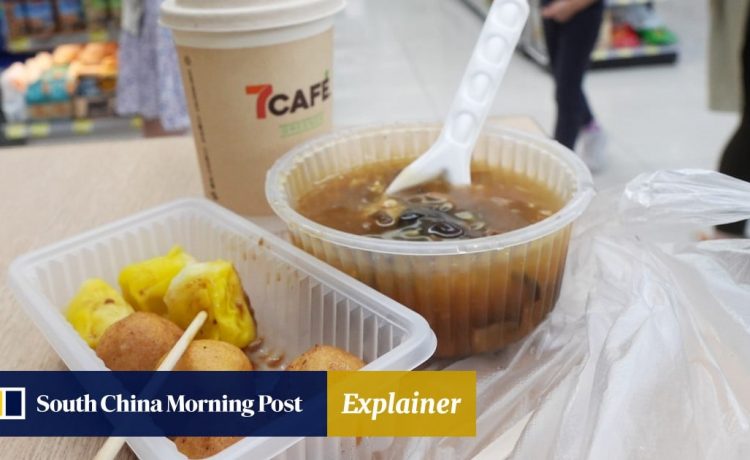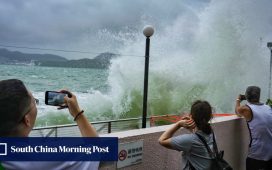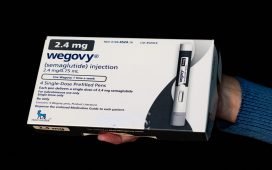Staff at one 7-Eleven store in Tsuen Wan told the Post reporter he could not eat the made-to-order noodles he had just purchased in the shop because it was served in a plastic container.
But when it came to pre-packaged food, such as sandwiches, staff at the store said they did not know if it could be eaten inside the store.

When the Post visited two other locations in Causeway Bay on the same day, staff did not stop the reporter from eating fish balls and siu mai that were also prepared on-site and served in plastic containers.
An employee at one of the Causeway Bay locations said customers could eat inside the shop and that they had not been given any notice to ban people from doing so.
Staff at the other store said while the shop never allowed dining-in, it was ultimately up to customers to decide where to eat.
2. What are the store policies?
The first stage of the Hong Kong ban on single-use plastics came into force last Monday, with restaurants prohibited from handing out plastic tableware such as cutlery and straws for takeaway orders.
Stores providing dine-in services are also prohibited from using plastic containers and lids, as well as tableware, under the ban stipulated in the Product Eco-responsibility (Amendment) Ordinance.
A 7-Eleven spokeswoman told the Post on Sunday night that its stores sold only takeaway food and drinks to customers, and outlets had fully complied with the ban.
“Our stores have transitioned to eco-friendly tableware, including FSC-certified paper cups, wooden forks, sugar cane-based spoons, bamboo chopsticks and paper drinking straws,” she said.
“We are currently in the process of revamping the containers used at our ‘Tsat Jai Sik Dong’ (7-Eleven Food Stall) for hot foods and iced beverages, as part of our ongoing efforts to improve our service and sustainability practices.”
Hong Kong 7-Eleven stores at sixes and sevens over plastics ban
Hong Kong 7-Eleven stores at sixes and sevens over plastics ban
The Post also reached out to convenience store chain Circle K for comment.
Lawmaker Doreen Kong, also a member of the committee that scrutinised the plastics ban legislation, said the standing counter spaces inside 7-Eleven where customers could eat constituted a dining area under the law.
Therefore, customers should not be allowed to eat made-to-order fish balls or other products served in plastic containers on the premises, she said.
3. How are dine-in spaces legally defined?
According to the legislation, a caterer is engaged in dine-in services when “the purpose of serving the food or drink [is] for consumption on the premises”.
The Environmental Protection Department has said that if a supermarket or convenience store provided made-to-order food, such as fried noodles, and had a dining area on-site for customers to eat, then the meal would be considered dine-in. Therefore, plastic tableware and packaging would be prohibited.
But pre-packaged food prepared for immediate consumption and placed on shelves, such as boxed sushi or sandwiches, was considered takeaway and therefore plastic packaging was allowed.
Make or break for eco-friendly utensils in Hong Kong? Post tests some options
Make or break for eco-friendly utensils in Hong Kong? Post tests some options
4. What about food courts?
According to the department, food courts operated under the same regulations as other dine-in areas, even though the premises might be owned by a developer rather than the restaurants on-site.
“This business model is basically the same as that of regular restaurants, hence food stalls in food courts are required to comply with the regulatory requirements on tableware for dine-in service,” it said.
However, if customers made purchases at a food court for takeaway, this would not be considered dine-in and therefore plastic cups and containers could be used, it added.
5. Are there any exemptions?
Under the legislation, caterers are permitted to use plastic as long as the food or drink product is pre-packaged at a location separate from the premises from which it is being sold.
However, the ordinance also states that products will no longer be considered pre-packaged if the product is opened or undergoes any “alterations” on the premises before being sold.
Lawmaker Kong said that this provision included reheating pre-packaged products on-site, like those fish balls and siu mai sold at convenience stores.
“If it has been reheated or opened then it would not be exempted by law,” Kong said.







